Hyundai Tucson: Camshaft - Description
CVVD (Continuous Variable Valve Duration) System is a device to control the optimum open and close timing according to the driving mode by changing the valve opening section.
It is composed of cam shaft, CVVD assembly, and CVVD acatuator.
The valve opening time operates in proportion to the rpm of control shaft.
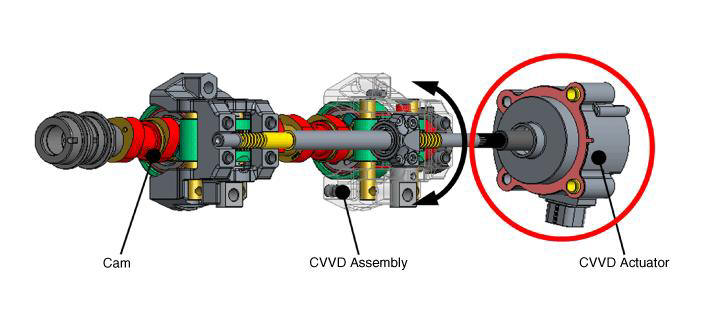
Operation Principle
CVVD System Operating Mode
Optimum Valve Timing by Engine Load
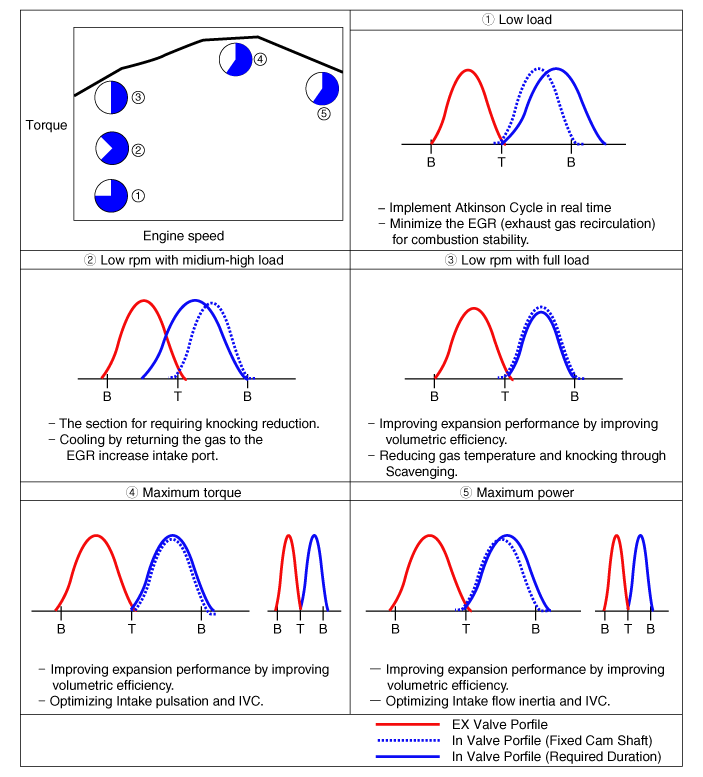
Removal
- Disconnect the battery negative terminal.
- Remove the cylinder head cover.
(Refer to Cylinder Head Assembly - "Cylinder Head Cover")
- Turn the crankshaft damper pulley so that No. 1 piston is at top dead center.
(1) Turn the crankshaft damper pulley and align its groove with the timing mark on the timing chain cover
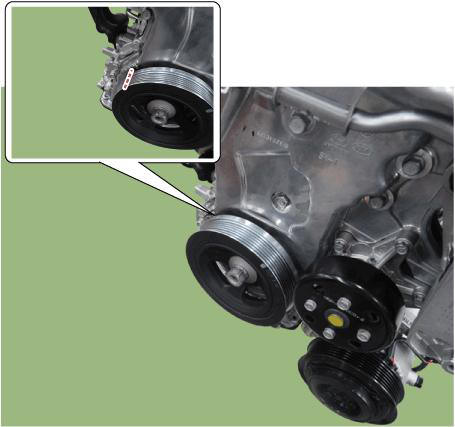
(2) Check the timing chain, be sure that the timing mark (A) of each sprocket is matched with the timing mark (B) (color link) of the timing chain.
If not, turn the crankshaft damper pulley by one revolution (360º).
Intake CVVT
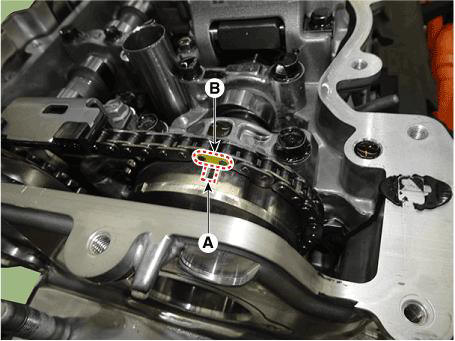
Exhaust CVVT
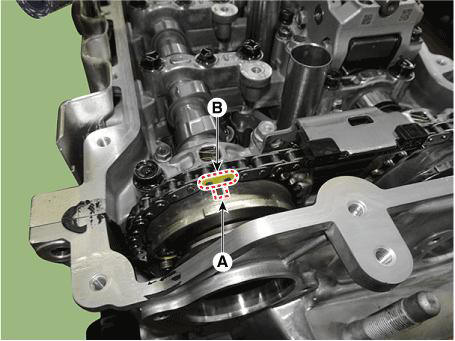
- Remove the Intake variable force solenoid (VFS) valve (A).
- Remove the cam to cam guide (A).
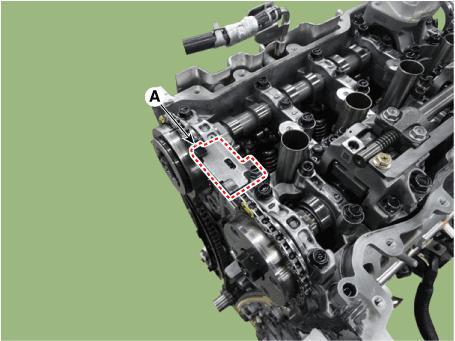
- Reomve the front bearing cap (A) and intake camshaft bearing caps (B).
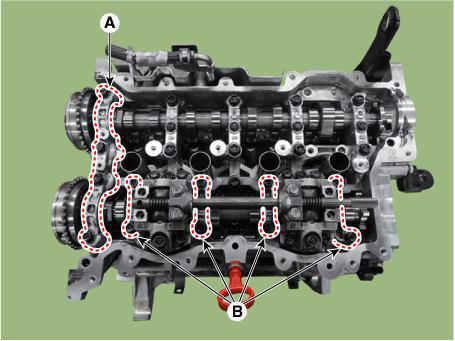
- Remove the service hole bolt (A).
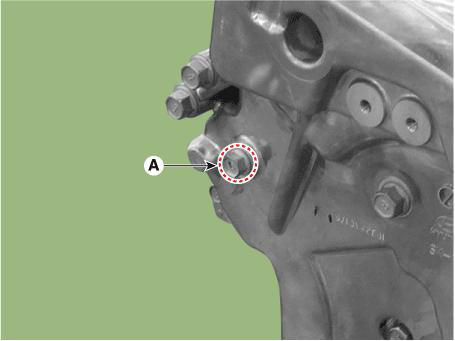
- Remove the engine mounting support bracket.
(Refer to Engine and Transaxle Assembly - "Engine Mounting")
- Lift the engine using the jack to obtain space.
- Release the lock by putting down rachet plate (B) of timing chain tensioner with using back of tiny awl (A).
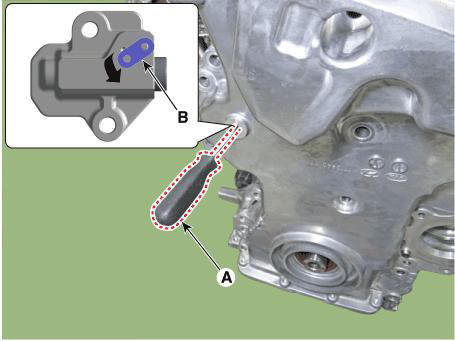
- Remove the intake oil control valve (OCV) & center bolt (A).
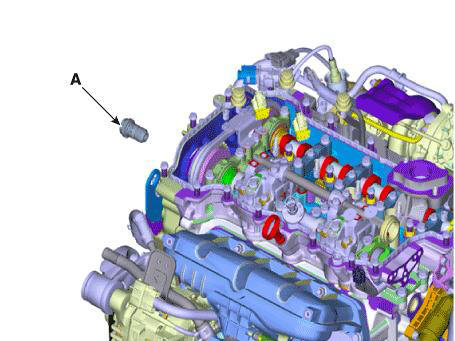
WARNING
- To prevent impurities from entering intake oil control valve (OCV) & center bolt, wear rubber gloves.
- Intake oil control valve (OCV) and center bolt, hold the
hexagonal portion on the camshaft with a wrench
to prevent the camshaft from rotating.
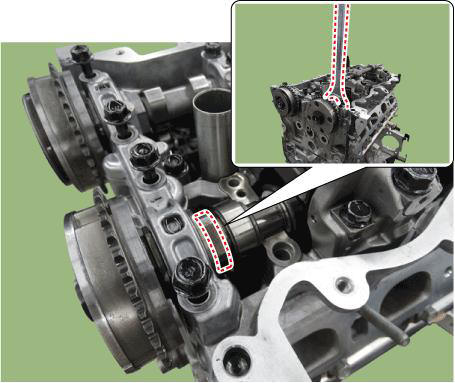
- Remove the CVVD assembly.
WARNING
- After removing the CVVD unit, make sure that the parts such as lifter, cam, etc are not separated.
- Ensure that the CVVD components are not damaged.
When Using the CVVD fixture
(1) Install the CVVD fixture (A) over the CVVD assembly.

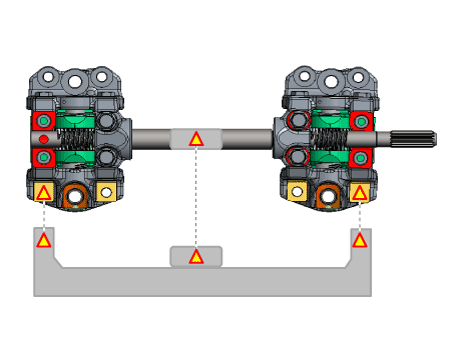
(2) Remove the CVVD assembly.
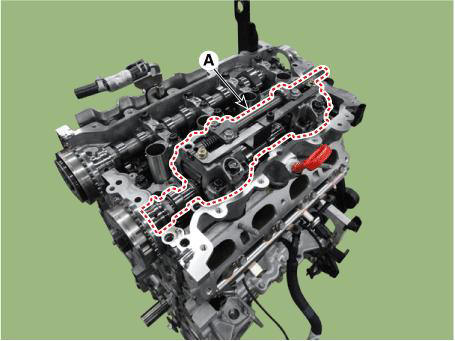
READ NEXT:
 When not using the CVVD fixture
When not using the CVVD fixture
(3) Remove the CVVD assembly.
Remove the Intake CVVT (A).
Installation
Install the Intake CVVT (A).
Install the CVVD assembly (A).
WARNING
After installing the CVVD, check whether the swing arm is
separated
 When Using the CVVD fixture
When Using the CVVD fixture
When installing the CVVD assembly mounting bolts (M6), tighten sequence
shown.
Tightening torque :
1ST
4.9 - 6.9 N.m (0.5 - 0.7 kgf.m, 3.6 - 5.1 lb-ft)
2nd
9.8 - 11.8 N.m (1.0 - 1.2 kgf.m, 7.2 - 8.7 lb-ft)
Remove the CVVD fixture
 Intake/Exhaust CVVT Timing Mark
Intake/Exhaust CVVT Timing Mark
Intake CVVT Timing Mark
Exhaust CVVT Timing Mark
Install the cam to cam guide (A).
Tightening torque :
9.8 - 11.8 N.m (1.0 - 1.2 kgf.m, 7.2 - 8.7 lb-ft)
Install the intake variable force solenoid (VFS) valve (A).
Tightenin
SEE MORE:
 Engine Mechanical System
Engine Mechanical System
Components
Pulley
Stator assembly
Rotor assembly
Brush holder assembly
Front bracket assembly
Rear bracket assembly
Inverter assembly
Removal
Turn the ignition switch OFF and disconnect the battery (-) terminal.
Disconnec
 Active Air Flap(AAF)
Active Air Flap(AAF)
Remove the front bumper.
(Refer to Body (Interior and Exterior) - "Front Bumper Cover")
Disconnect the active air flap connector (A).
RH
LH
Remove the active air flap (A) after loosening the mounting screws.
RH
Information
- Home
- Hyundai Tucson - Fourth generation (NX4) - (2020-2023) - Owner's Manual
- Hyundai Tucson - Fourth generation (NX4) - (2020-2023) - Workshop Manual